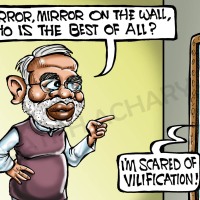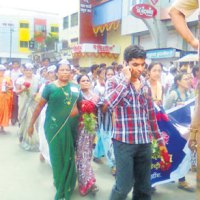Violence against women and sexual harassment are such daily occurrences that only the most egregious and horrendous make front page news, although other not so prominent incidents are stored away in the collective conscience.
“Guilt” and – in South Asia – “family honour” have a powerful hold, and most incidents of even horrific violence get suppressed.
But the gruesome gang-rape of a young woman in a bus in New Delhi in mid-December, the long wait for reports of her precarious condition and her eventual death caught the conscience of most Indians with access to mass media.
Although there are continuing questions on the part of the marginalized sections of India as to why the rapes and gang-rapes that members of their communities suffer regularly fail to be noticed by the mainstream media, there seems to be a consensus of hope that this is a moment for possible future change in gender relations in India.
It has been likened to the Tunisian and the Egyptian pro-democracy movements of 2011. Another comparison could be with the two Tiananmen movements – of 1976 following the death of Zhou Enlai and the 1989 in the wake of former Chinese communist party general secretary Hu Yaobang’s passing away. The first had the tacit backing of Deng Xiaoping who was soon to emerge as the supreme leader and usher in economic reforms while keeping a tight lid on dissent. The second Tiananmen incident led to a tightening of the regime before an acceleration of economic reforms that have led to runaway growth alongside massive corruption, denial of trade union rights, discrimination against migrants and other problems the people cannot protest about.
While India is a chaotic democracy, it too is at a crossroads. The current upsurge that has affected most cities, where large numbers of people have staged spontaneous demonstrations, could be harnessed for real change towards making India a less violent place for women as well as for children and old people, or it could see it turn towards being one where retribution and insecurity rule.
The incident and its aftermath have been making front page news for weeks now. Hindu chauvinists and other conservatives have been falling over each other in coming up with bizarre suggestions – one wants women to stayconfined to their households, while another wants them to call a would-be rapist ‘brother’ and beg for mercy. Meanwhile the what-was-she-wearing crowd has been active and vocal.
One outstandingly disturbing aspect of the reactions to the gang-rape has been widespread and shrill demand for harsh punishments for the gang-rape accused. While calls to hang them quickly are widespread, other frequently aired demands are for them to be castrated and given Saudi-style punishments. Hundreds of mostly young people around the country have held placards calling for the accused to be hanged or castrated, or subject to other violent punishments.
Among the bizarre reactions and demands is one asking lawyers not to represent the rapists. No one, not even those the whole world deems responsible for the most monstrous of acts, ought to be exempt from the presumption of innocence until proven guilty. Legal representation is a fundamental right and it should have been taken for granted that all lawyers are duty-bound by the “cab rank rule” – to take on a brief so long as they have no conflict of interest. But two bar associations in New Delhi have openly declaredthat they would not appear for the alleged gang-rapists.
India’s Bar Council did step in and say it was “concerned” over the two associations’ stance. But that followed a day after former Indian Supreme Court judge Markandey Katju declared the bar associations’ moves “illegal”.
“Professional ethics require that a lawyer cannot refuse a brief, provided a client is willing to pay his fee, and the lawyer is not otherwise engaged. Hence, the action of any Bar Association in passing a resolution that none of its members will appear for a particular accused, whether on the ground that he is a suspected terrorist, rapist, mass murderer, etc, is against all norms of the Constitution, and professional ethics,” Justice Katju said in a newspaper article.
Other than Justice Katju’s comment, there has been silence from the leading lights of India’s judiciary, from politicians as well as from the media. Hardly anyone else has spoken out against such calls which have been heard each time the public and the media deems someone massively guilty.
There were pressures against representing Ajmal Kasab, the Pakistani sole survivor from the group that staged a terror attack on Bombay on 26 November 2008 causing scores of deaths. Kasab was hanged in secret on 21 November 2012. A large number of witnesses and cameras captured his image while he was on a shooting spree in a railway station and it was a foregone conclusion that he was guilty as charged. However even he ought not to have been denied due process but questions have been raised as to whether that happened. Lawyers have argued that one of those on death row in India now, Mohammed Afzal Guru, lacked proper legal counsel and did not get a fair trial.
India’s dysfunctional government has been found wanting in its response to demands for summary punishment for rapists and other similar violent calls. Leadership has been sadly lacking at a time when public fury has to be channeled in constructive directions.
About the only positive decision the government has taken in recent weeks was the formation of the Justice Verma Committee to recommend amendments to Indian laws dealing with sexual assault. But mere passage of laws and amendments will fail to make a dent when police forces enjoy impunity, society remains deeply patriarchal and son-preference as well as other anti-female practices remain.
In the coming weeks and months, the judiciary, the government and the media could either handle the case of the gang-rapists with sobriety, to douse public demands for harsh retribution and to begin the spadework for turning India into a genuinely law-abiding country. Or it could succumb to populist rhetoric and cave in to calls for hanging and other violent punishments, usher in tough-talking leaders and turn India into even more of a faux democracy than it is now.












